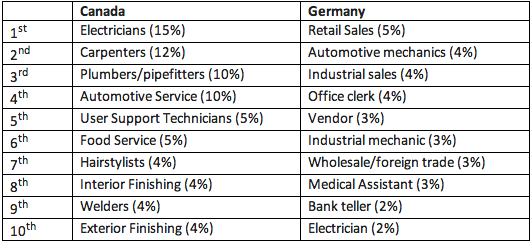The Life of the Lowe's:
Seeking The Life I Could've Lived
When the ISU was first assigned in class, I had absolutely no idea of what my family’s heritage was, or what it was about. I somewhat had an idea of my background involving some Irish. As it turns out I was partially right. After talking with some of my family members, and discussing about my family’s past I learned a few things. I found out that majority of my family members contain the heritages of being Irish, Scottish, German.
Some more information that I discovered from my Aunt helped me figure out on how far back I needed to look into my family history. My Great-Grandpa (known as Pa in my family) was born in 1927. Both of his parents were born in Nova Scotia. Therefore, while discussing more about the topic I came to the conclusion that my Pa's parents must have been mid age in the early 1900’s. Concluding to when they immigrated into to Canada. As I began to learn more information about my families past, this is what I eventually found.

Majority of my family are from Germany, and had immigrated into Canada moving to Nova Scotia. My Pa’s parents names were Annie Lowe, and Jim Lowe. They were both born in Hants County, Nova Scotia. Although, my family doesn’t have a lot of information as to who exactly came from Germany or why. Here are some push and pull factors of possible reasons as to why they didn't stay and left.
In the 1900’s Germany had a population close to the amount of 410,392 people, and yet Germany had a 5% unemployment rate. “Germany had split into two cultures. One was a conservative, authoritarian, business-driven group that was very wary of the working class while the other was the working class that greatly benefited in the time in Germany known as the Grűnderzeit – the good times” (The Learning History). They thrived in power. Industries grew bigger, stronger, and began to have higher rates. And railroads began to grow larger in order to help the industries flourish. "This created an extraordinarily explosive mixture where the most powerful nation in the world, Germany, had the most powerful revolutionary movement in the world – the German Social Democratic Party. And it's a function of the pace of change, and the pace of urbanization, that you both had this amazing growth of military power and growth of working class power – and they were both evident together (THE GREAT WAR, 2004). Although the good times did not last long, and Germany was then taken place to war!
As I was told my Great-Great Grandparents had immigrated out of Germany before the war was taken place. I believe my Great-Great Grandparents made the right choice by immigrating to Canada, because even if they had no knowledge as to what was happening in the place they call home, they were still able to escape the horrible things that were coming their way if they had stayed.
If my Great-Great Grandparents would have stayed in Germany, and not immigrated to Canada my life wouldn't be as different compared to how it is now living in Canada. Although some things in Germany are better, than some things in Canada. For example, Germany's unemployment rate is at a rate of 4.5% as of March 2016, and Canada's unemployment rate is a rate of 6.9% as of May 2016. Employment in Germany has a higher chance of being employed next to the employment line in Canada by 2.4%. Therefore, it would be better living in Germany at this time if I was in seek of an occupation.
 |
| This image shows the percentage rates for each type of occupation in each country, comparing the rates from highest to lowest from each country. |
If I were living in Germany at this age my education can go very far in both countries. In Canada "Secondary Schooling begins at the age of 12-13 years of age" (Nation Master, 2016), but in Germany the "Secondary Schooling begins at the age of 10 years of age" (Nation Master). The Government in Canada is spending "5.5% on education" (Nation Master), and Germany is "spending 5.08%" (Nation Master) making Canada more accountable for getting a better education. It has now been brought up that in Germany University Tuitions will now be free in soem areas. As when looking at Canada they only allow loans through OSAP, or if someone in the household makes collectively less than 50000 a year, you are able to receive free tuition. Therefore, in some circumstances getting an education in Canada would benefit me in many ways during Primary and Secondary Schooling, but once university comes around Germany would be my best option to get the best education.
While living in Germany at my age my health would be in pretty good shape. Both for Germany and Canada "life expectancy is at a rate of 81%" (Find The Data, 2016). Although the "obesity rate in Canada is at percentage of "26.2%, and Germany is at a percentage rate of 25.1%" (Find The Data). This shows my health could possibly be more at risk while living in Canada vs. Germany. Germany believes "everyone should have access to medical services, regardless of employment, income, or ability to pay" (Context Institution, 2016). "The Canadian health care system expresses the fundamental equality of Canadian citizens. The plan’s coverage is comprehensive, universal, and accessible. Patients are free to choose among providers, and physicians serve primarily in private practice on a fee-for-service basis. Hospitals are independent, nonprofit institutions overseen by boards of trustees" (Context Institution).
Strengths:
Germany
|
Canada
|
(Context Institutions)
|
(Context Institutions)
|
Weaknesses:
Germany
|
Canada
|
|
|
Overall, with the comparison of Health Care between Germany and Canada. If I were to be living in Germany I would roughly still have the same amount of protection and coverage as I do living in Canada.
For Rights and Freedoms when it comes to Canada and Germany they are more similar than different. Canada has their Rights and Freedoms in order by the Canadian Charter of Rights and Freedoms, while Germany contains a book of the "Basic Law For the Federal Republic of Germany" (juris, 2016). Germany and Canada both have simliar rules applying to the Rights and Freedoms of citizens in their countries. Therefore, if I lived in Germany I would have almost the same life as I do living in Canada now.
Germany contains a great rating for employment, making it easier to attempt applying an occupation in Germany rather than Canada. Education in Germany allows me to have high opportunities in order to receiving an education as well as in Canada although tuition in Germany are not required at all therefore making it better and easier to attempt to receive a diploma. Health Care in Germany allows great coverage and protection when dealing with my health, and has a great level of strengths as well as Canada. Finally, Rights and Freedoms allows me to have an equal amount of freedom to allow me to express myself just as well as I can in Canada.
Overall, if I were to be currently living in Germany I believe my life would be a little different as to the location of where I am, but when it comes to employment, education, health care, and rights and freedoms Germany wouldn't be that much different compared to me living in Canada now. I'm glad my family has immigrated to Canada, because then I would have never been able to experience life the way I do now.

No comments:
Post a Comment